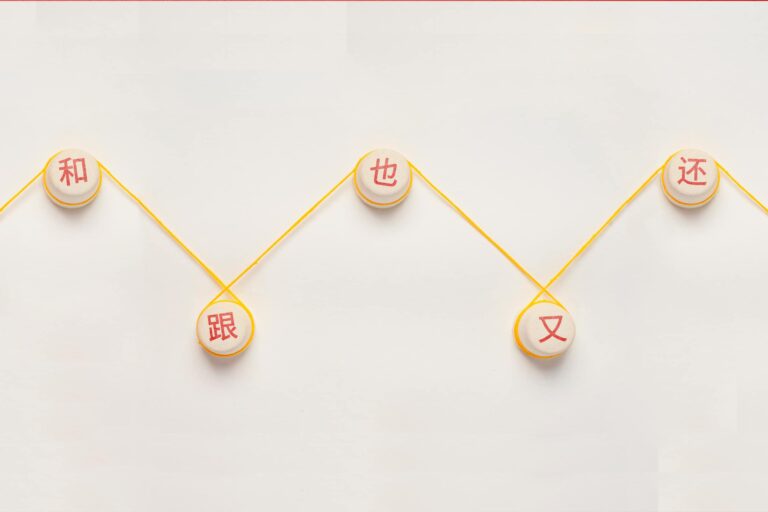10 Festive Chinese Christmas Greetings and Traditions

Believe it or not, Christmas is actually a pretty popular holiday in China.
In fact, you’ll see the signs of Christmas fever in larger cities across China, such as Beijing and Shanghai where they’ll often put up giant decorated pine trees in shopping centers and host Christmas plays and events.
If you’re in China or spending time with Chinese speakers, here’s how to spread Christmas cheer to friends and family in Mandarin through Chinese gestures and phrases, and by partaking in Christmas traditions.
Download: This blog post is available as a convenient and portable PDF that you can take anywhere. Click here to get a copy. (Download)
5 Jolly Chinese Christmas Greetings
圣诞快乐! (shèng dàn kuài lè!) — Merry Christmas!
圣诞快乐 is definitely the go-to phrase to use when greeting someone during the holidays.
Quite literally, it means “Christmas happy.” The extended version of this phrase is 圣诞节快乐 (shèng dàn jié kuài lè), which simply adds 节, meaning “holiday,” into the equation. It’s also worth noting that 圣诞节, literally meaning “Holy Birth Festival,” is the full phrase for “Christmas.”
Either greeting is appropriate to say to friends, family and strangers, although 圣诞节快乐 is a bit of a mouthful. Feel free to listen to the pronunciation with this video from Learn Chinese with Emma.
A Chinese Christmas Tradition Tidbit
Even though only around 5% of China’s population identifies as Christian, it’s fine to use 圣诞快乐 around the holidays, especially if you’re in a large Chinese city. Christmas is seen as more of a fun, commercial, non-national holiday to non-Christian Chinese people.
In big cities, you’ll likely see stores pumping out holiday tunes, the streets lit up with Christmas lights and extravagant, massive Christmas trees. You’ll also see performers dressed as 圣诞老人 (shèng dàn lǎo rén), which, funnily enough, literally translates to “Old Christmas Guy,” obviously in reference to “Santa Claus.”
耶诞快乐! (yē dàn kuài lè!) — Happy birthday, Jesus!
If you have a Christian Mandarin-speaking friend, you can give them a very special, more religious Christmas greeting.
耶诞快乐 is a great religious greeting to say to Christians around Christmastime. 耶 is short for 耶稣 (yē sū) meaning “Jesus.” These characters individually don’t actually have any meaning in Chinese but serve as a transliteration of “Jesus” and other foreign names. Literally, 耶诞快乐 translates to “Merry Jesus’ birthday.”
Due to cultural sensitivities, it’s best to limit this phrase to Christian Chinese speakers.
A Chinese Christmas Tradition Tidbit
As mentioned before, though only 5% of China is composed of active Christians, those numbers are growing. Unfortunately, according to the BBC, many Christian Chinese people in smaller cities turn to underground churches due to religious persecution from the Chinese Communist Party. On the other hand, expatriate-dense cities such as Shanghai have grown to accommodate numerous denominations, with tons of churches offering multilingual services in various languages, including Chinese.
That being said, if you have a Chinese friend who’s Christian, you may not even know it.
佳节快乐! (jiā jié kuài lè!) — Happy holidays!
Christmas is just one of the many holidays that take place in China during the month of December. As a matter of fact, there are many holidays during this time that are more widely celebrated by Chinese people than Christmas.
If you want a more inclusive phrase to use during the winter months that doesn’t involve saying “Merry Christmas,” 佳节快乐 is a good alternative. It literally translates as “Merry Festivities.” You can practice saying it with this video from Lauren Liu.
Again, 圣诞快乐 is uttered by Christian and non-Christian Chinese people alike, but using this broader phrase is a bit more polite.
You can also say 节日快乐 (jiérì kuàilè) to wish someone “Happy Holidays!”
A Chinese Christmas Tradition Tidbit
冬至 (dōng zhì) is the winter solstice, which occurs around December 22nd and often involves ancestor veneration, big feast days, getting together with family and celebrating what some consider the Chinese Thanksgiving.
Another holiday is the 腊八节 (là bā jié) or the Laba Festival, which occurs on the eighth day of December. This holiday is the day that the Buddha attained enlightenment, and Chinese people (especially Buddhists) will celebrate by eating Laba congee (or rice porridge), preparing garlic vinegar and participating in farming festivals.
致以节日的问候与温馨的祝福! (zhì yǐ jiérì de wènhòu yǔ wēnxīn de zhùfú!) — Season’s greetings and warm wishes!
Here’s another way to wish someone well in the holiday season without any religious connotations. If you’re writing Christmas cards or sending greetings through WeChat, you can either say 致以节日的问候 (zhì yǐ jiérì de wènhòu) for “Season’s Greetings” or 致以温馨的祝福 (zhì yǐ wēnxīn de zhùfú) for “Warm Wishes.”
You can also combine the two phrases with 与 (yǔ), meaning “and.”
A Chinese Christmas Tradition Tidbit
致以 (zhì yǐ) means “to extend greetings to someone.” It’s also considered an informal greeting, so save this one for your close friends and stick with the previous wishes for elders and acquaintances.
寒假快乐! (hánjià kuàilè!) — (Have a) Happy winter vacation!
If you have Chinese-speaking friends traveling over winter break, you can wish them happy travels with the phrase 寒假快乐. This is also a good general greeting since it’s more about having fun during time off and not specific to any celebration.
A Chinese Christmas Tradition Tidbit
Normally, families in China won’t go on winter vacation in December unless their children attend an international school that includes Christmas and New Year’s on the holiday calendar. This greeting is more appropriate for international communities in China, although you can also say this to locals before their Lunar New Year or Spring Festival travels.
5 Charming Chinese Christmas Traditions
Offer and receive gifts with both hands (and bring apples!)
Whether it’s for Christmas, someone’s birthday or a polite expression to a boss or coworker, you should always present gifts with both hands. Why? Well, it’s considered very polite.
Just handing a gift to someone or using one hand to receive a gift comes off as slightly rude. When you use two hands to take or present a gift, no matter how small, your body language indicates your respect for the gift giver or receiver. In China, this is known as 面子 (miàn zi) or “saving face.” And if you’ve been studying modern Chinese culture for some time, you might know a bit about the importance of saving and giving face.
Thus, give Christmas gifts with both hands. If someone gives you a gift, thank the giver profusely.
A Chinese Christmas Tradition Tidbit
When in doubt, you can always gift your loved ones with apples. In Mandarin, “Christmas Eve” is 圣诞夜 (shèngdàn yè) but it can be referred to as 平安夜 (píng’ān yè), which also translates to “Silent Night.”
So what’s this got to do with apples?
平 is a homonym for 苹 (píng), short for 苹果 (píngguǒ), which means “apple.” And that’s the whole story of how the humble apple became known as the “Christmas fruit” or 圣诞果 (shèngdàn guǒ).
Of course, apples aren’t the only presents you can give.
When it comes to giving an appropriate Christmas gift, don’t expect to be given a wishlist. Apples are a fairly recent trend for Christmas gifts, along with treating friends to dinner or a round of drinks during karaoke. Since Christmas isn’t such a strong cultural holiday, you can easily spread Christmas cheer by taking some friends out for a fun Christmas Eve. But if it’s a tangible present you want to give, see this video for some further insight into shopping for Christmas gifts in China.
Greet others by singing some carols in Mandarin
If you love to sing and happen to be in a major Chinese city, you could easily take part in the culture of carol singing around Christmas. While it may not be as common in China as it is in the West, foreign families often organize door-to-door caroling within expatriate communities. Some foreign-run bars and restaurants also host bar-hopping caroling events during the Christmas season.
If you can’t participate in caroling, you can always stick to the karaoke lounge with your Chinese friends.
A Chinese Christmas Tradition Tidbit
“ 叮叮当 ” (dīng dīng dāng) or “Jingle Bells” is a pretty well-known carol in China. Other carols may not be as familiar to Chinese listeners, but it couldn’t hurt to learn as many as you can: Here’s a Chinese version of “We Wish You a Merry Christmas.”
Put up a “Tree of Light.”
While trees in commercial areas are normally decorated with ornaments and lights as they would out West, Christmas trees in Chinese households are decorated a little differently.
Instead of ornaments, they’ll adorn their tree with paper flowers and red paper lanterns. In place of tinsel, they’ll wrap the tree with red paper chains as a symbol of happiness. They also refer to their Christmas tree as 圣诞节光树 (shèng dàn jié guāng shù) or “Tree of Light.”
A Chinese Christmas Tradition Tidbit
Red is a significant color in China. Not only is it the color of the flag, but it also represents beauty, good fortune, joy and vitality. The color is a symbol of nationalism and a bright future, which is why Chinese Christmas decorations are mostly red.
Decorate the house with red paper lanterns.
Tinsel, lights, wreaths and snow spray are just some of the many Western-style Christmas decorations you can buy in grocery and department stores in China these days. But if you want to put a Chinese spin on your Christmas decor, consider hanging red paper lanterns, or 红纸灯笼 (hóng zhǐ dēnglóng). Even though they’re available in stores, you can also make origami paper lanterns if you love arts and crafts!
A Chinese Christmas Tradition Tidbit
The red lantern is one of the most prominent emblems in Chinese culture. They mostly represent life and prosperity and are hung during Chinese national holidays. In the wintertime, they also become prayers for light, sun and warmth to return after the winter.
Have a saxophone-playing Santa in your living room.
Years and years ago, a Chinese commercial campaign showcased a romantic Santa Claus playing the saxophone, and since then, the saxophone playing 圣诞老人 has just stuck.
Whether it be little Santa figurines or large displays in malls and other establishments, Santa is usually depicted with a saxophone, though in the last few years, he’s also been associated with instruments like the French horn, trumpet and violin.
A Chinese Christmas Tradition Tidbit
Chinese netizens have joked that Chinese Santa should be playing a culturally relevant instrument, such as the 二胡 (èrhú) or “erhu.” This historically significant instrument is vertical, two-stringed and bowed, and is thought to date back t the Tang dynasty.
Why Should I Learn Different Chinese Christmas Greetings?
- Cultural and linguistic differences can affect how we communicate holiday greetings. In some ways, Christmas is celebrated pretty similarly between China and America. However, there are some key differences between how we say and express season’s greetings that are important to know.
Knowing these differences can only add to your arsenal of Chinese cultural knowledge, which goes hand-in-hand with language fluency.
- As with all languages, communication isn’t just verbal. There are multiple Christmas greetings to know in Mandarin, but knowing the right words is just the beginning. Gestures are a big part of fluency, as well.
Sure, you could simply say “Merry Christmas!” and leave it at that, but where’s the fun in that? Learning alternative ways of wishing someone a happy holiday in Chinese, both verbally and through gestures, is a great way to add fluency to your growing Mandarin skills. And if you use Chinese videos to learn new greeting vocabulary, like the ones on FluentU, you can see this in practice.
FluentU takes authentic videos—like music videos, movie trailers, news and inspiring talks—and turns them into personalized language learning lessons.
You can try FluentU for free for 2 weeks. Check out the website or download the iOS app or Android app.
P.S. Click here to take advantage of our current sale! (Expires at the end of this month.)
- Any situation that involves giving gifts differs a bit in China from many Western countries. You can’t just toss someone a gift as casually as you may do in America. There’s a respectful way of offering and receiving a gift, which we’ll go over in this article.
There are so many cool ways to celebrate the holidays in China. From hosting parties to singing carols to decorating, you’re sure to have a great time during this time of year.
Now get out there and impress your Chinese friends with your knowledge of Chinese Christmas traditions and greetings. Don’t forget the apples!
Download: This blog post is available as a convenient and portable PDF that you can take anywhere. Click here to get a copy. (Download)
And One More Thing...
If you want to continue learning Chinese with interactive and authentic Chinese content, then you'll love FluentU.
FluentU naturally eases you into learning Chinese language. Native Chinese content comes within reach, and you'll learn Chinese as it's spoken in real life.
FluentU has a wide range of contemporary videos—like dramas, TV shows, commercials and music videos.
FluentU brings these native Chinese videos within reach via interactive captions. You can tap on any word to instantly look it up. All words have carefully written definitions and examples that will help you understand how a word is used. Tap to add words you'd like to review to a vocab list.
FluentU's Learn Mode turns every video into a language learning lesson. You can always swipe left or right to see more examples for the word you're learning.
The best part is that FluentU always keeps track of your vocabulary. It customizes quizzes to focus on areas that need attention and reminds you when it’s time to review what you’ve learned. You have a 100% personalized experience.
Start using the FluentU website on your computer or tablet or, better yet, download the FluentU app from the iTunes or Google Play store. Click here to take advantage of our current sale! (Expires at the end of this month.)











